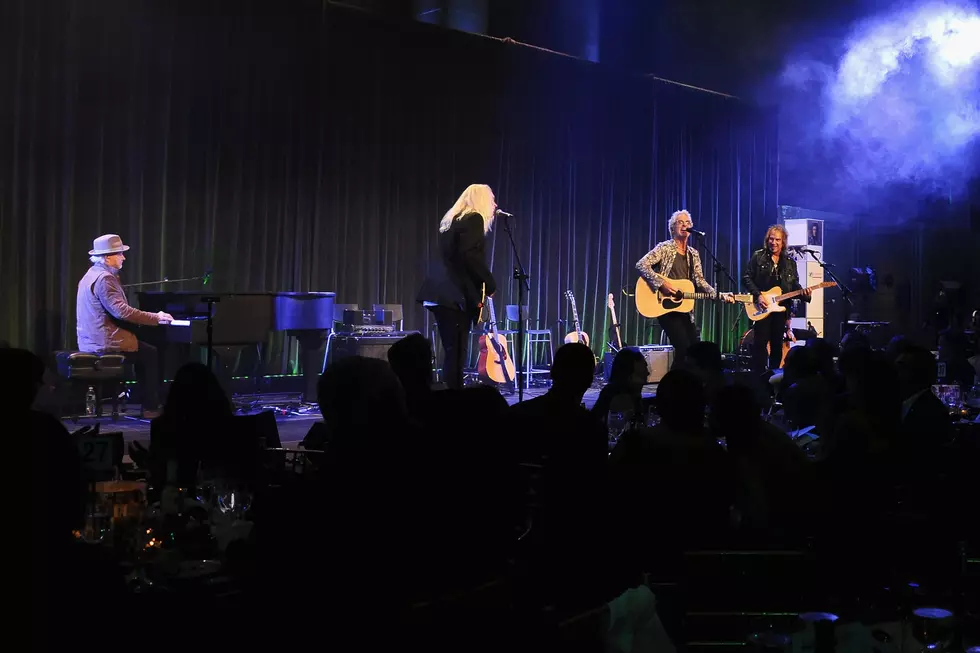
How REO Speedwagon Wrote ‘Ridin’ the Storm Out’
Not many bands can lay claim to writing a song that prompted fans to throw their stash out the car window. As REO Speedwagon keyboardist Neal Doughty tells UCR, “Ridin’ the Storm Out" had just that effect.
Singer Kevin Cronin told UCR last year that the song came out of a hiking experience in the Rocky Mountains where the weather unexpectedly took a turn for the worse. But it's the siren-like squeals included in the track that has most fans running for cover. “Don’t worry, it’s not the police behind you,” Doughty laughs. “It’s only REO Speedwagon.”
It’s been 55 years since the keyboardist formed the band while attending the University of Illinois. He still has vivid memories of cramming all of their gear into the back of a station wagon as they went from one Midwest town to another. (Cronin joined five years later, just in time for 1972’s R.E.O./T.W.O.) “Believe it or not, we're still not tired of doing it,” Doughty says.
REO Speedwagon will be back on the road with fellow Midwest rockers Styx this month, launching the Live & UnZoomed tour with special guest Loverboy. (Fans can order discounted $25 tickets during Live Nation's annual Concert Week, which runs through May 10.)
“We plan to keep going as long as we possibly can," Doughty says.
How are things going for the tour?
We’ve been playing a few shows here and there, just so that we don’t get rusty. They’re smaller venues. But we love the giant amphitheater tours. We’re going to have a couple of days of rehearsal right before the first concert. Other than that, we’re all getting healthy and full of energy and that will show up onstage.
When did REO first meet Styx?
Kevin is from Chicago, and so is Styx. People think there was a rivalry between REO and Styx, but that just goes way back to the day when Kevin was playing acoustic sets in bars all over Chicago. Styx was still not a national group yet. Kevin had a band called Fuchsia way back then. Fuchsia and Styx were always ending up [in a local battle of the bands]. The first time Styx won, Kevin goes, “Well, they must have stuffed the ballot box, because I know we were better than those guys.” There’s still a little bit of that [rivalry] in there. Both bands are working together to make it a great night. But we’re still going, “Let’s try to outdo those guys tonight.” People are wondering, "How can you guys still be trying to play a better show than you did the night before?" A lot of it, of course, is the audience. But it’s also just the camaraderie that exists between Styx, REO and Loverboy. To this day, we’re going to call it a friendly competition, but we love those guys. Not to get too melodramatic or anything here.
"Roll With the Changes" is one of those songs that still sound great on the radio. How did you get that one to a place where it felt good?
Kevin left the group for a little while. That's one of the first songs that he brought back. He's playing the piano on that song and doing something that nobody else can do. We still can't figure out exactly what he's doing on the piano. We heard that [song] and really liked it immediately. But then it turned into a friendly competition between me and Kevin. I think that might have been the first song where he played keyboards on the song, and I'm going, "Well, if he's going to do something flashy on the piano, then I'm going to do something flashy on the Hammond B3 organ." I worked on that solo for a long time. It's probably the solo that people remember from me. It's just such a fun song with all of those vocals going on. It was fun to do it in the studio, and it still may be my favorite song to play live. The song just lends itself to a natural energy, and it still works every night.
Fans have an equally strong attachment to what you played on "Ridin' the Storm Out."
That was a song that [guitarist] Gary [Richrath] brought in, and Kevin kind of encouraged him. Together, they made it a little better. But that siren-type noise at the beginning of the thing, our producer, Bill Halverson, told us, "This song needs to start out with something that makes it feel like there's a storm coming." He said, "Let's get something [that sounds like] you're in a little cabin out in the Rocky Mountains and you hear the wind coming through the windows." That's where we went, "OK, let's all play around with the synthesizer and see if we can get a sound that sounds like the wind coming through the windows." I suggested that part where it starts low and goes up five octaves. Everybody really liked that sound. So that's the way the song begins and ends. The fact that it sounds so much like a police siren, we have all kinds of people telling us, "Well, I was driving down the road and that siren came on the radio, and I threw all of my pot out the window. For nothing." They're still mad at us for that. So if you hear that song come on, hopefully, you're not doing anything to impair your driving, but don't worry, it's not the police behind you. It's only REO Speedwagon.
Listen to REO Speedwagon's 'Ridin' the Storm Out'
You mentioned how long you worked on the solo for "Roll With the Changes." Was that typical?
They're all improvised, but a lot of times, kind of in pieces. We would work on a keyboard solo for a couple of days and it would always start with me playing something and then the guys would go, "Yes, this one part is right, but do something else over here." It would come down to me playing something and the guys going, "OK, that was great. Now play something better." Most of the solos were carefully orchestrated. We think of a solo, whether it's guitar or keyboards, as just being an extension of the melody that's going on. That's why most of our solos, instead of just being crazy, they really have been carefully thought out to fit the song. There's a lot of classic rock bands that don't have as many keyboard solos as we do. Gary Richrath loved keyboard solos, and he was always putting in a word. "OK, we need a keyboard solo in this part." Some of them, we really worked on for quite a while.
But still, they started out being improvised. Nobody wrote out sheet music of the solo for me. The little piano solo in "In Your Letter," that's one that I kind of thought up at home and took it into the studio completely in my head already finished. I just played it through once, start to finish, and the guys just started applauding. It was done in the first take. But a lot of times, they're a lot more difficult than that.
How did the album title for You Can Tune a Piano, but You Can't Tuna Fish come about?
I think it's an old Marx Brothers joke or something. It goes way back. But we'd never heard of it. We were at an aftershow party. Back in the day, we used to party all night. A friend of ours came up with that. He's going, "Hey, you guys have to call this album that." We were all in the party mode at that point and going, "OK, we will!" We had kind of made a promise to him at that point. That's probably our second most popular album, and a lot of people just say, "Well, it was that title that made me aware of the album." That's the one album title I can't take credit for. Now, The Earth, a Small Man, His Dog and a Chicken, the artist that did the illustration that turned out to be the cover, his working notes, he had a whole bunch of things to show us. Down at the bottom in pencil [that was written]. I said, “Hey, let’s just call it that.” I was kidding, but all of the sudden, everybody thought, “Yeah, that’s a great idea!” We’ve had people from both directions saying, “Yeah, that was a great title” and then there were people at our record label going, “No, no, that’s just too stupid. We don’t want you to do that.” But we were stubborn and we did it anyway.




